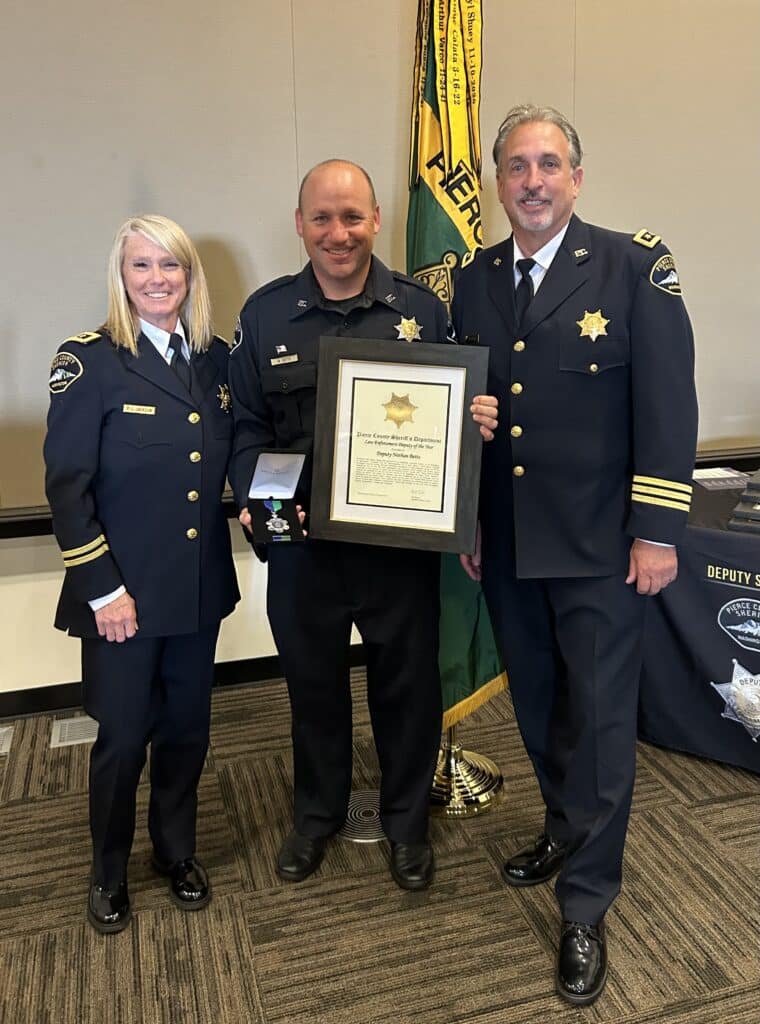Community Government Police & Fire
Communication is key for Pierce County Deputy of the Year Nathan Betts
His route to law enforcement wasn’t typical, but Nathan Betts has been collecting accolades as a Pierce County Sheriff’s deputy for years. His latest came Aug. 7, when he received the Deputy of the Year Award.
Prior to becoming a deputy, Betts spent years in sales with the Seattle SuperSonics basketball team, in real estate, and in sporting goods. Betts decided to go into law enforcement 12 years ago because he wanted to make a difference.
“I wanted to try to help people,” he said. “That’s why most of us get into this work, we want to help people.”

Chief of Patrol Patti Jackson, and Sheriff Ed Troyer of the Pierce County Sheriff’s Department presented the Deputy of the Year Award to Deputy Nathan Betts on Aug. 7.
Coordinating with other agencies
Betts previously worked in King County and Tukwila, but he said Pierce County is where he wanted to be. He currently works as an investigator in the Peninsula Detachment office in Purdy.
Before his law enforcement career, he earned a bachelor’s degree in business administration. He combines knowledge gained from that degree with an innate ability to bring people together to look at challenges in a unique way.
Several years ago, he observed that agencies in adjacent counties weren’t always on the same page with information. He launched a monthly meeting with officers from Kitsap and Mason counties, the city of Shelton, and the state Fish and Wildlife and Corrections departments to share ideas, get communication flowing, and build relationships. Taking the initiative to bring those agencies together won Betts a Standing Ovation Award from Pierce County in 2022.
Communication is important, he said. That goes not for only communicating with colleagues and community members, but also for crime suspects. He said that the ability to communicate allows officers to talk themselves out of a lot of problems while out on a call.
Confronting the addiction crisis
His work as an investigator requires him to follow up on cases to try to solve crimes. About 90 percent of those crimes involve property.
Working with code enforcement, the Gig Harbor Key Peninsula Homeless Coalition, local food banks, medical and mental health are all part of his job.
“I like to attack problems from both sides,” he said. “We make arrests, but on the flip side, what if we get people healthier, more productive, and they can lead a better life? I want to be a good liaison between the community and our department, and help where I can.”
When he encounters a person battling addiction or homelessness, he looks at the issue with compassion.
“I give them a ride where they need to go, and try to approach it with resources to get them off drugs, and into housing,” he said. “At the same time we put them in prison, and we will continue to do that. But I can’t affect the (drug) supply side of this.”
He’s trying to affect the demand, he said.
He said it’s unfortunately quite common to arrest someone and learn he previously arrested a parent or other family member.
“They’re falling in with their parents, and if they’re living in a drug-infested house the repeat of the pattern is high.”
Breaking the cycle
Betts said he gets tired of arresting the same people over and over and wants to find ways to break the cycle. He tries to make connections with everyone he encounters. He said he has a strong connection with people he has arrested.
“I have nothing to do with what goes on in jail, and I look at it as I’d like to get them healthy,” he said. “A lot of times they’re using drugs, they’re not healthy, they’re living in drug houses, and we approach that with code enforcement. I think to myself, would I want to live next to this? Sometimes it gets a little personal. I always ask how can we help them, and how can we make this better?”
He encourages everyone to do what they can to help make their communities stronger and better.
“Donate to your local charities,” he said. “We use them to fund these things, like clothing, food, shelter, hotels. And vote. I don’t tell people who to vote for, but I tell them to vote.”
